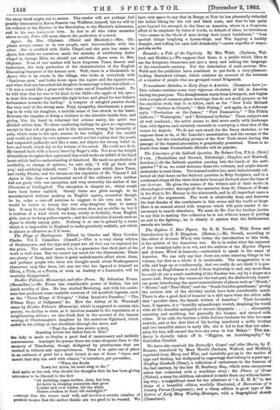Agnes. By Mrs. Oliphant. (Hurst and Blackett.)—Mrs. Oli- phant always
seems to us two people, each irreconcilable with the other. She is credited with Salem Chape4 and she puts her name to Agnes, but while we ourselves made the mistake of attributing Salem Chapel to George Eliot, we should not attribute Agnes even to Mrs. Oliphant. None of oar readers will have forgotten Tozer, deacon and butterman, the very perfection of the characteristics of the English Dissenting bourgeois of the keener sort. Well, there is a blacksmith in Agnes, who is an oracle in the village, who looks at everybody with "luminous eyes," and looks down upon the squire and the squire's son,
and when that son has asked his daughter in marriage is thus described :— " It was a sound like a great sob that came out of Stanfield's heart. To be told thus that he was to be kind to his child—the apple of his eye— to hear this stranger boy assert his right to her, and plead for her father's forbearance towards his darling! A tempest of mingled passion shook the very soul of the strong man. Fury, sympathy, desolateness, a yearn- ing to be with his daughter, a terrible sense of loss struck to his heart.
Between the impulse of doing a violence to the intruder beside him, and giving him his hand in reluctant but solemn amity, his spirit was divided within him. To these conflicting feelings he gave no expression, except in that sob or groan, and in the moisture, wrung by intensity of pain, which came to his eyes, unseen in the twilight. For the candid soul could not deny its own nature—could not but confess that the youth had responded gallantly and like a man, nor abjure the strong belief in love and truth which lay at the bottom of his creed. He could not do it. He turned back with a heavy heart by Roger's side. Not even the weight of tronblous thoughts that oppressed him could make an infidel of the loyal heart which had no understanding of falsehood. He made no profession of cordiality, or change of opinion ; he said only, I will go back with you, l and subduing himself, went." Is that the pen which drew Tozer,
and ruddy Phosbe, and the debate on the expulsion of Mr. Vincent ? All Agnes is like that—a sentimental novel of the ordinary sort, neither bad nor good, with one exception, and very unworthy the author of the Chronicles of Carlingford. The exception is chapter xv., which would have been better omitted. Surely there are plots enough to be manufactured without making an English squire, scoundrel though he be, order a cast-off mistress to suggest to his own son that it would be better to betray her own step-daughter than to marry her. It may be real that, though the scene does not so strike us, but it is realism of a kind which we keep, wisely or foolishly, from English girls, just as we keep police-reports ; and the circulation of novels Buell as Agnes is chiefly among girls. Nothing is or can be gained by a scene which it is impossible in England to make genuinely realistic, yet which is almost as offensive as if it were.


































 Previous page
Previous page